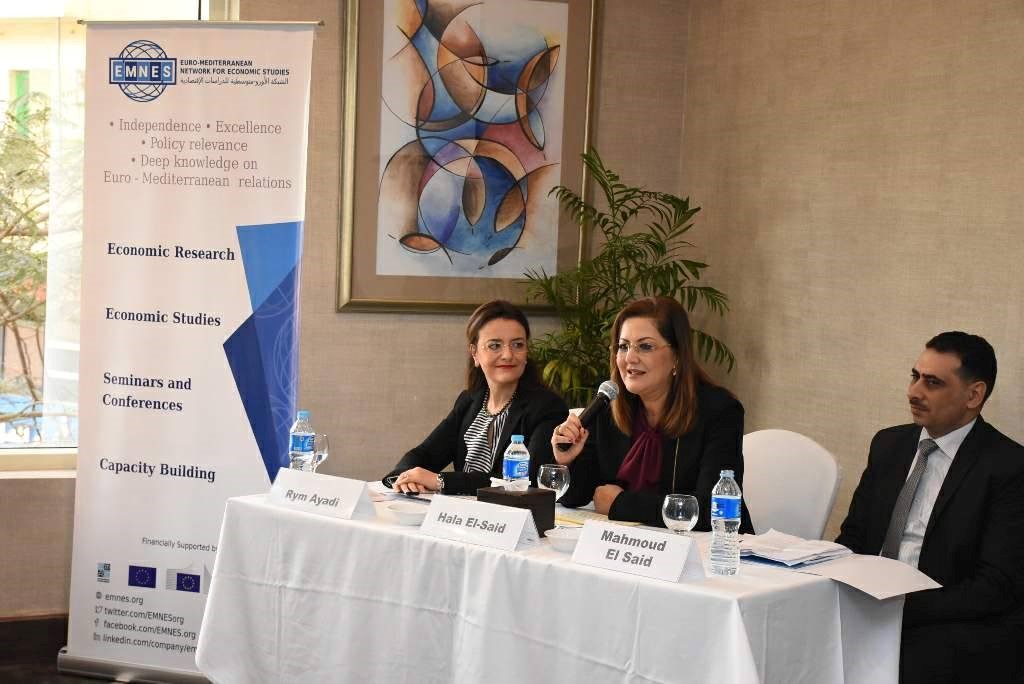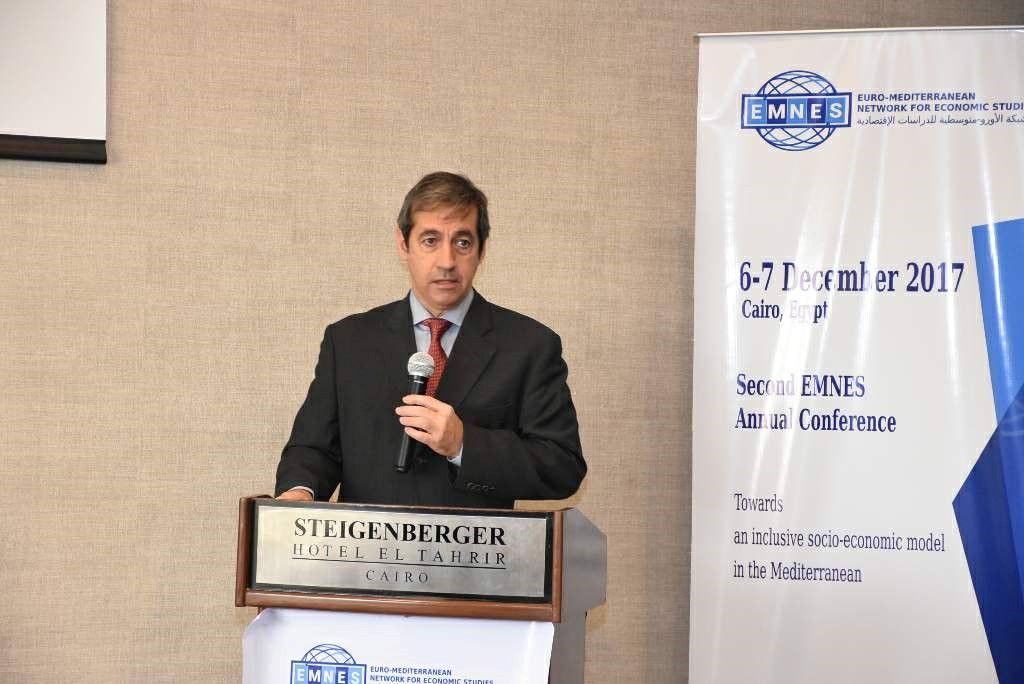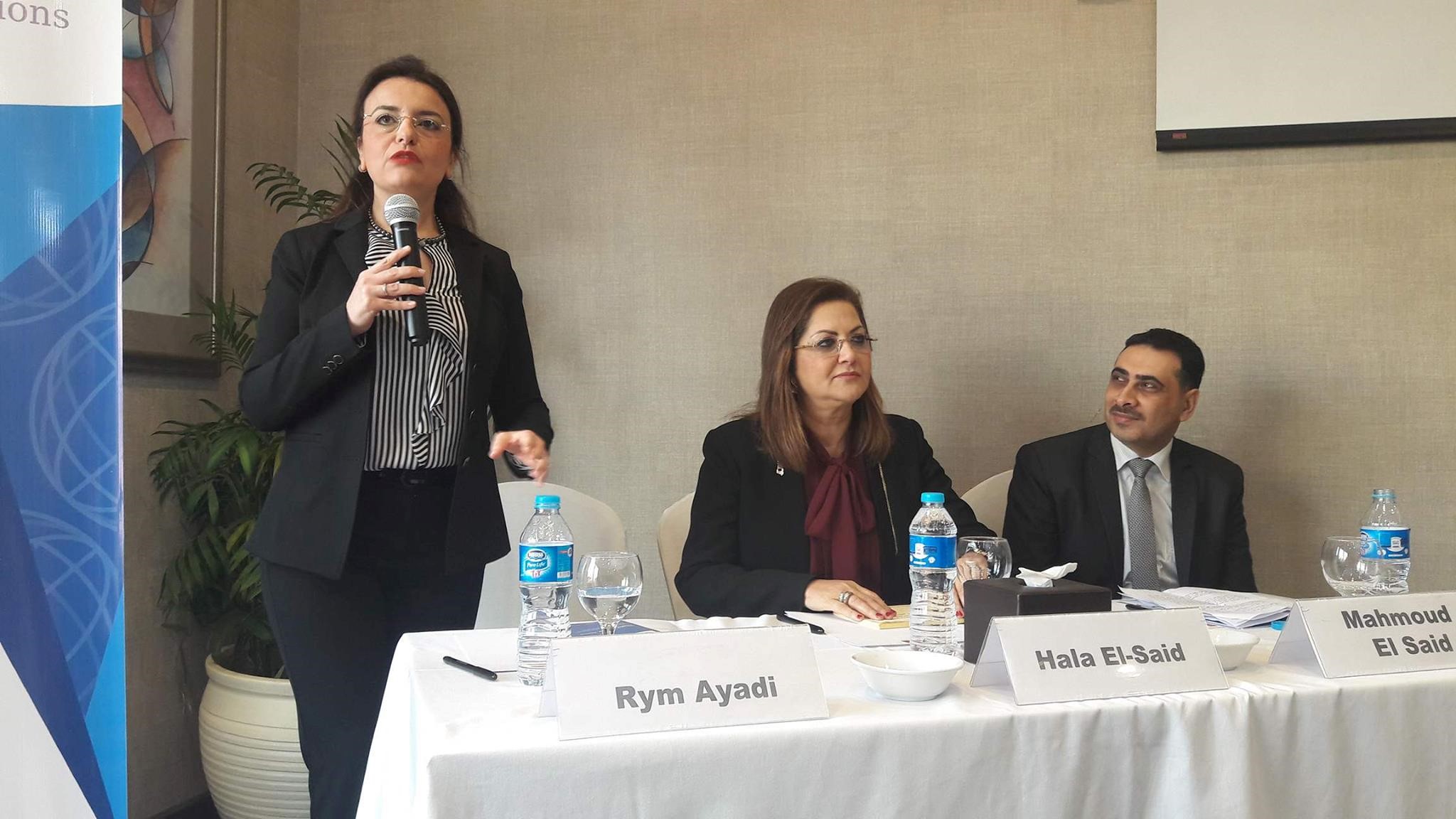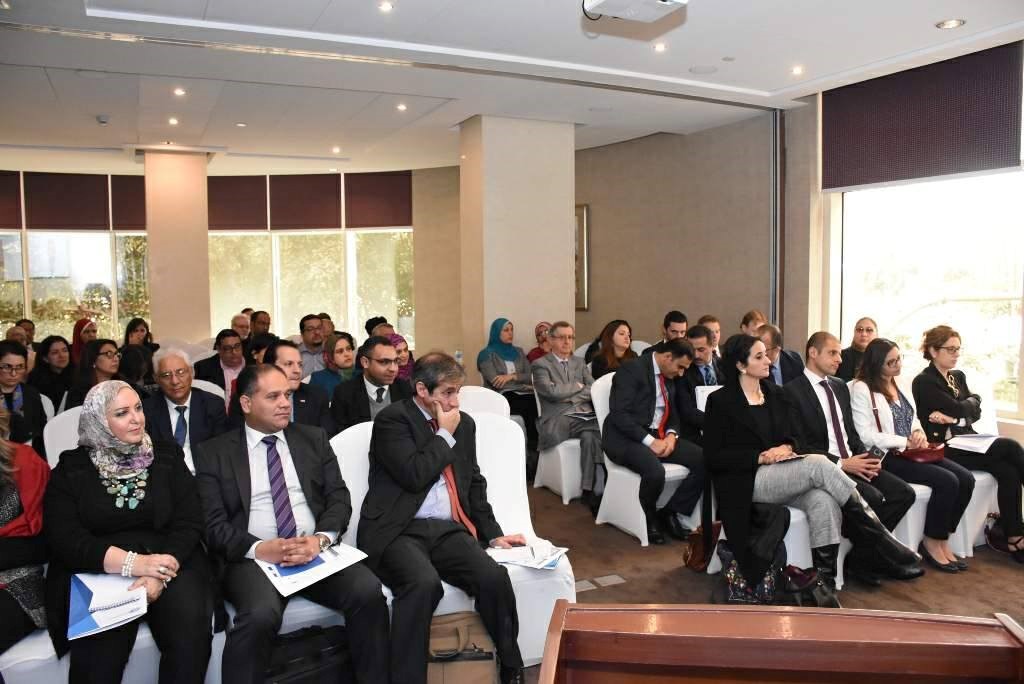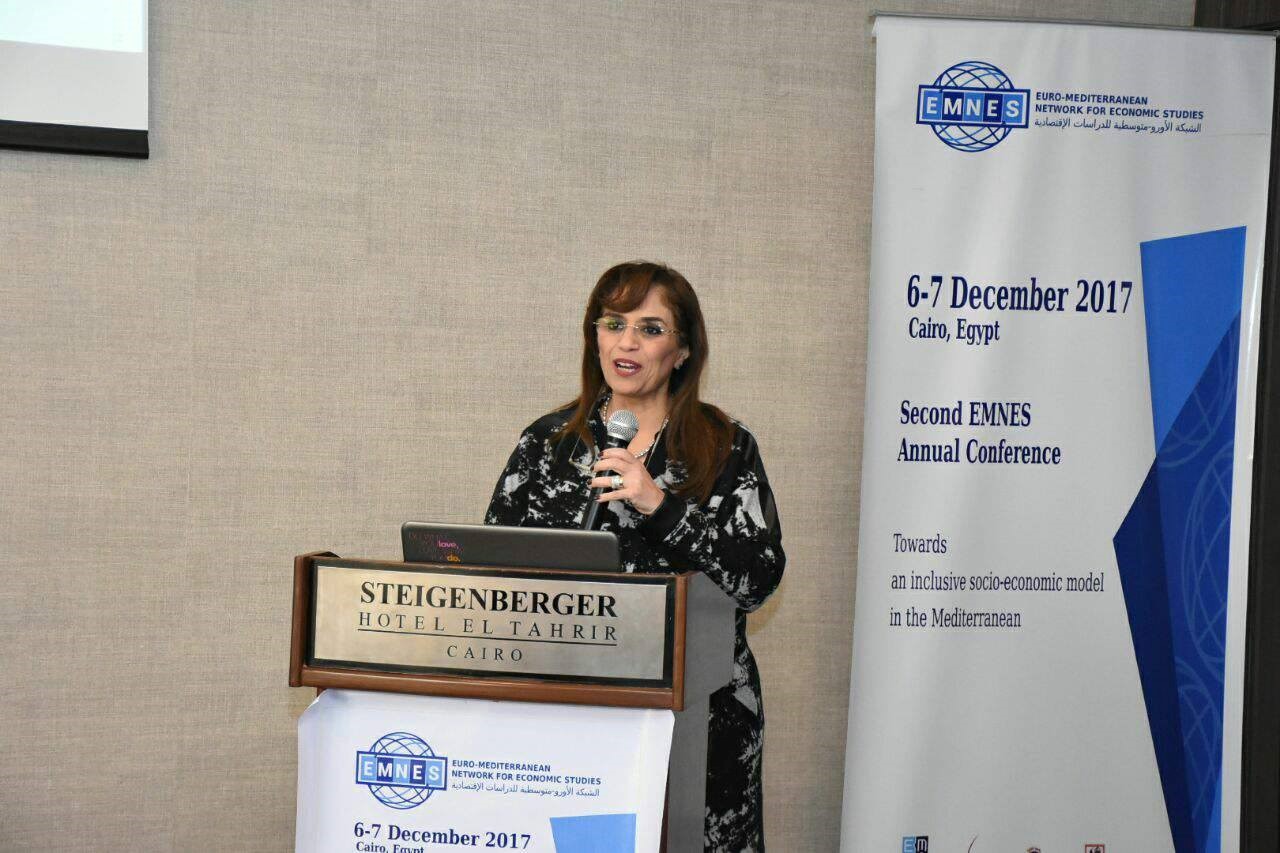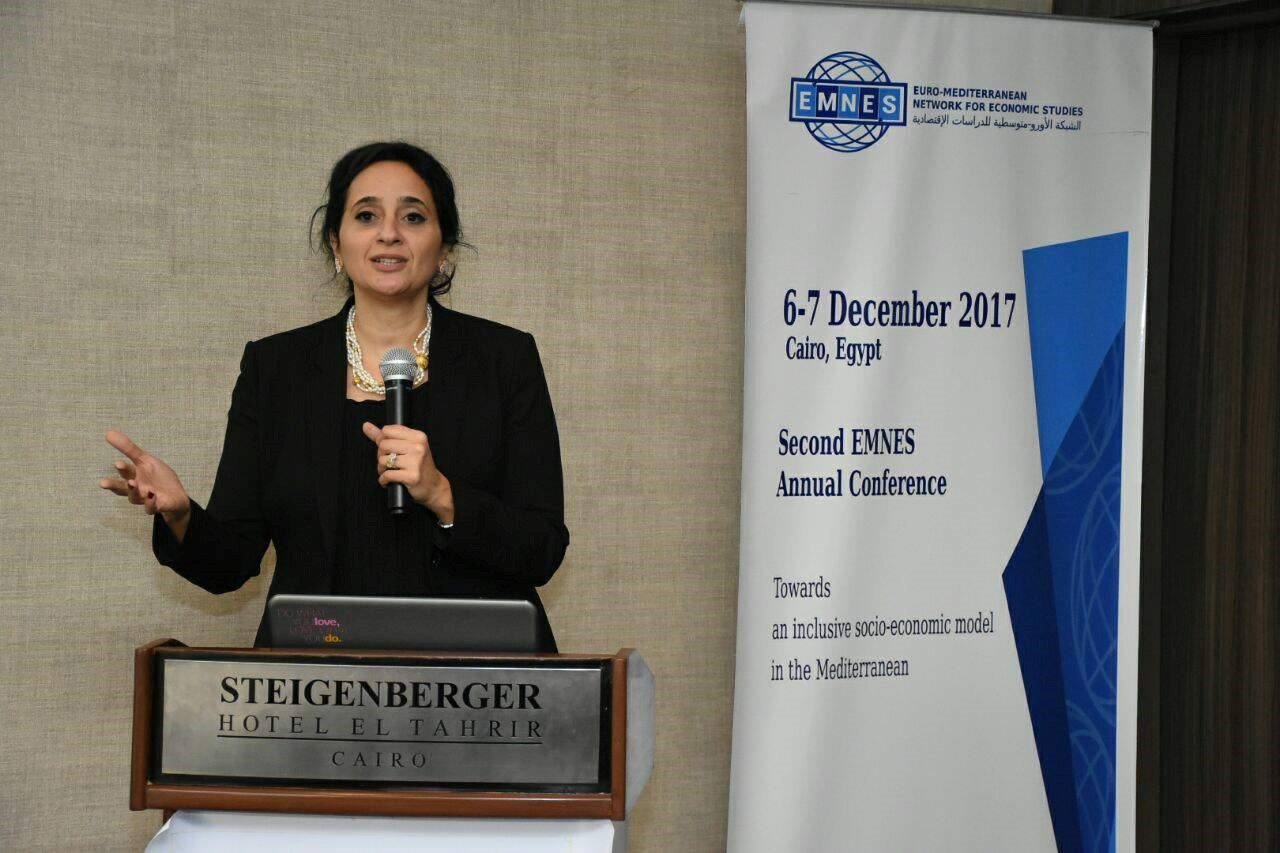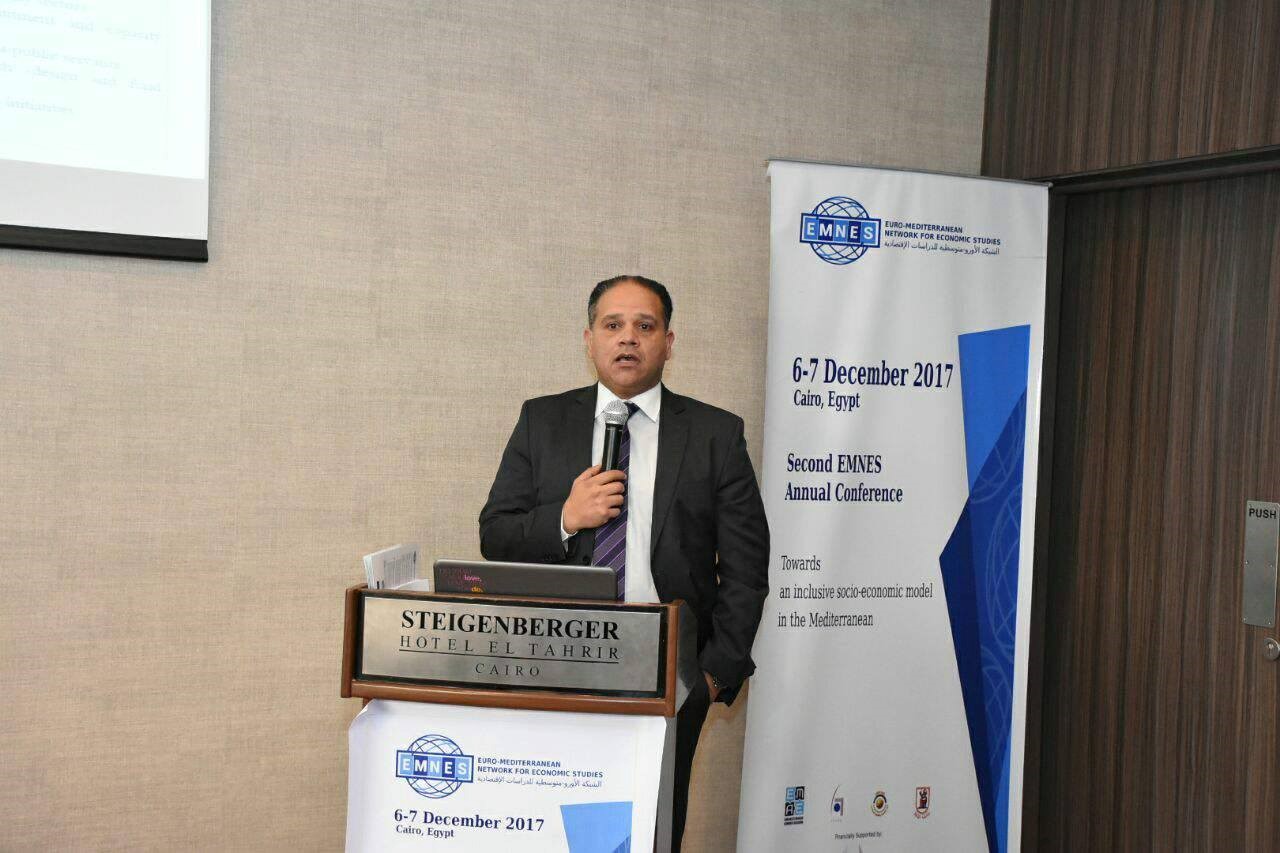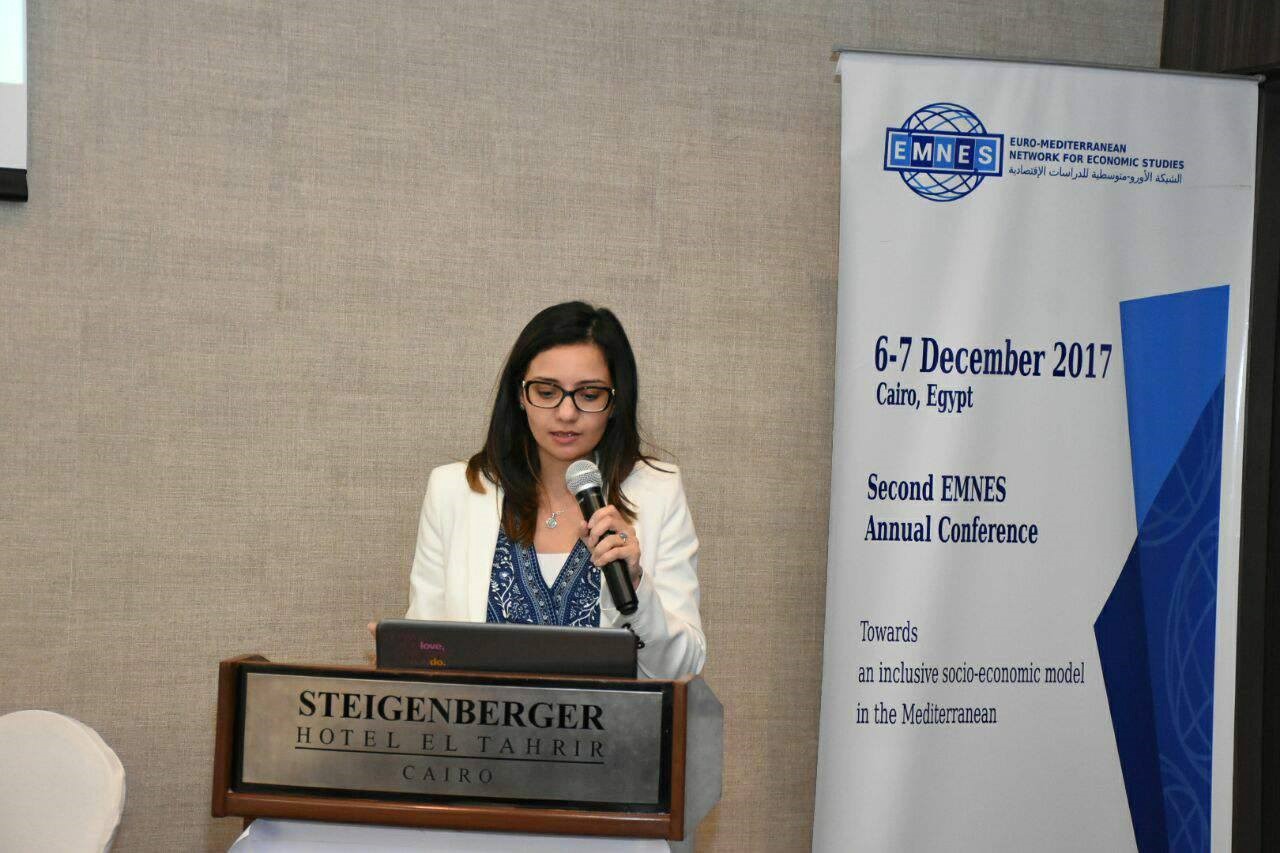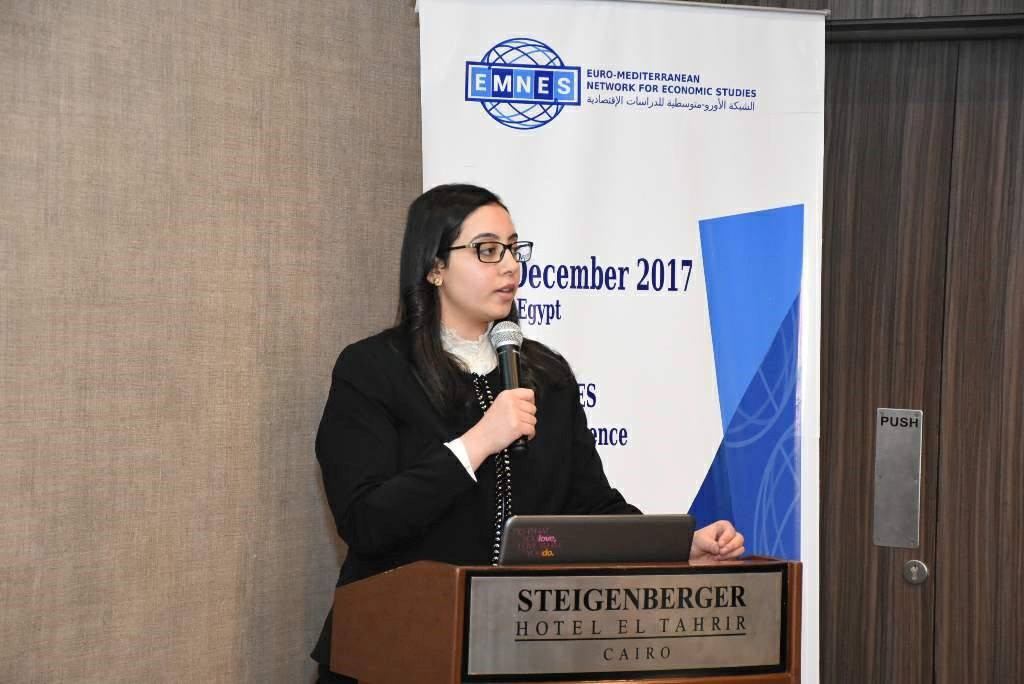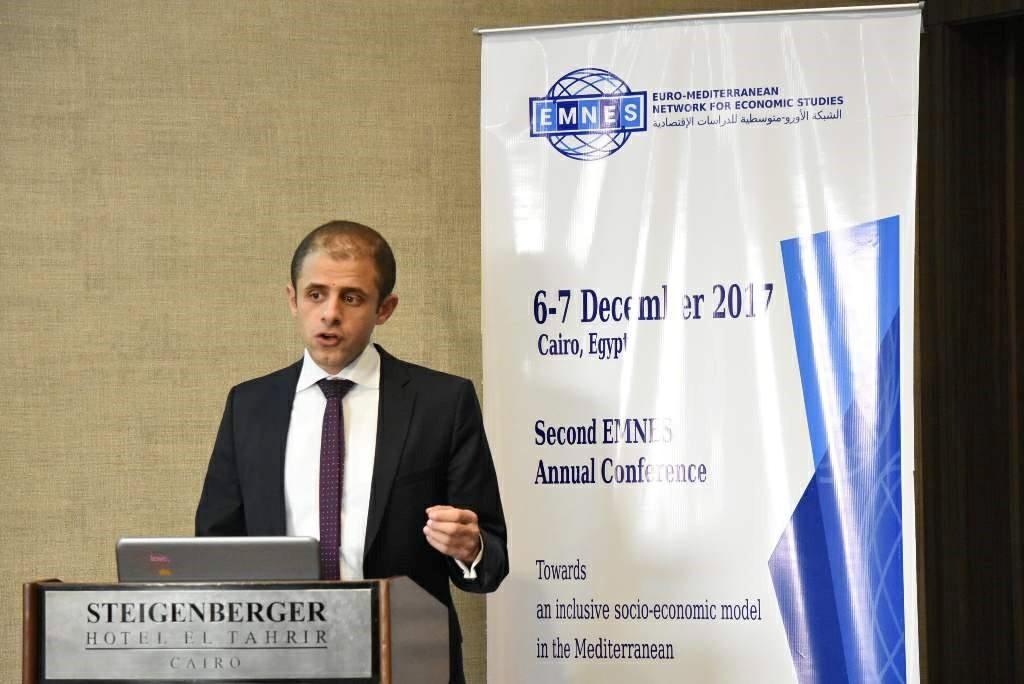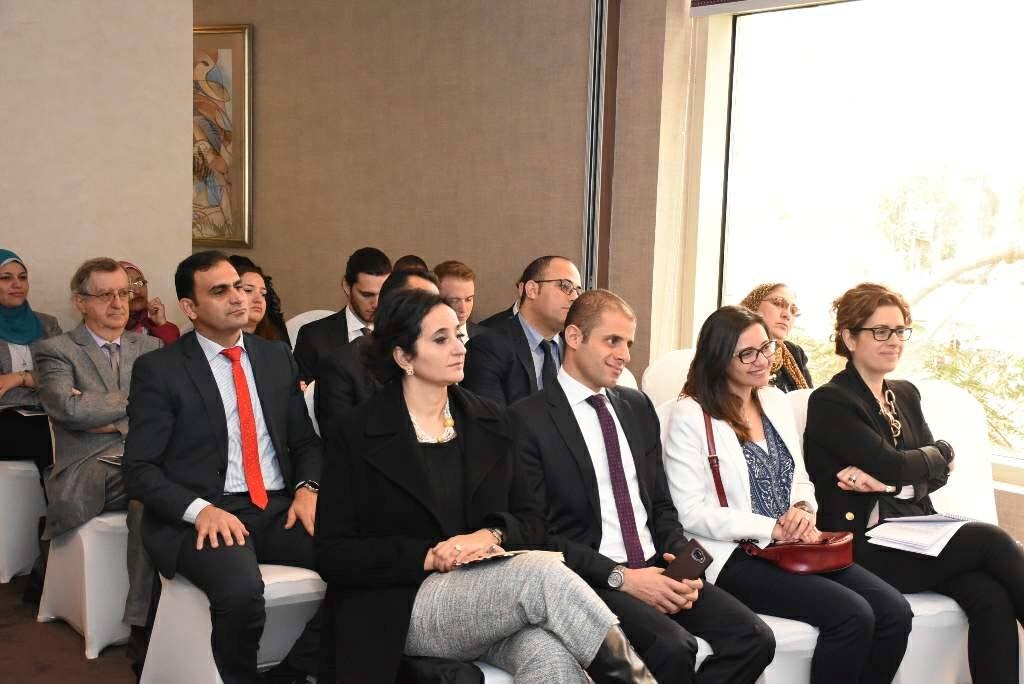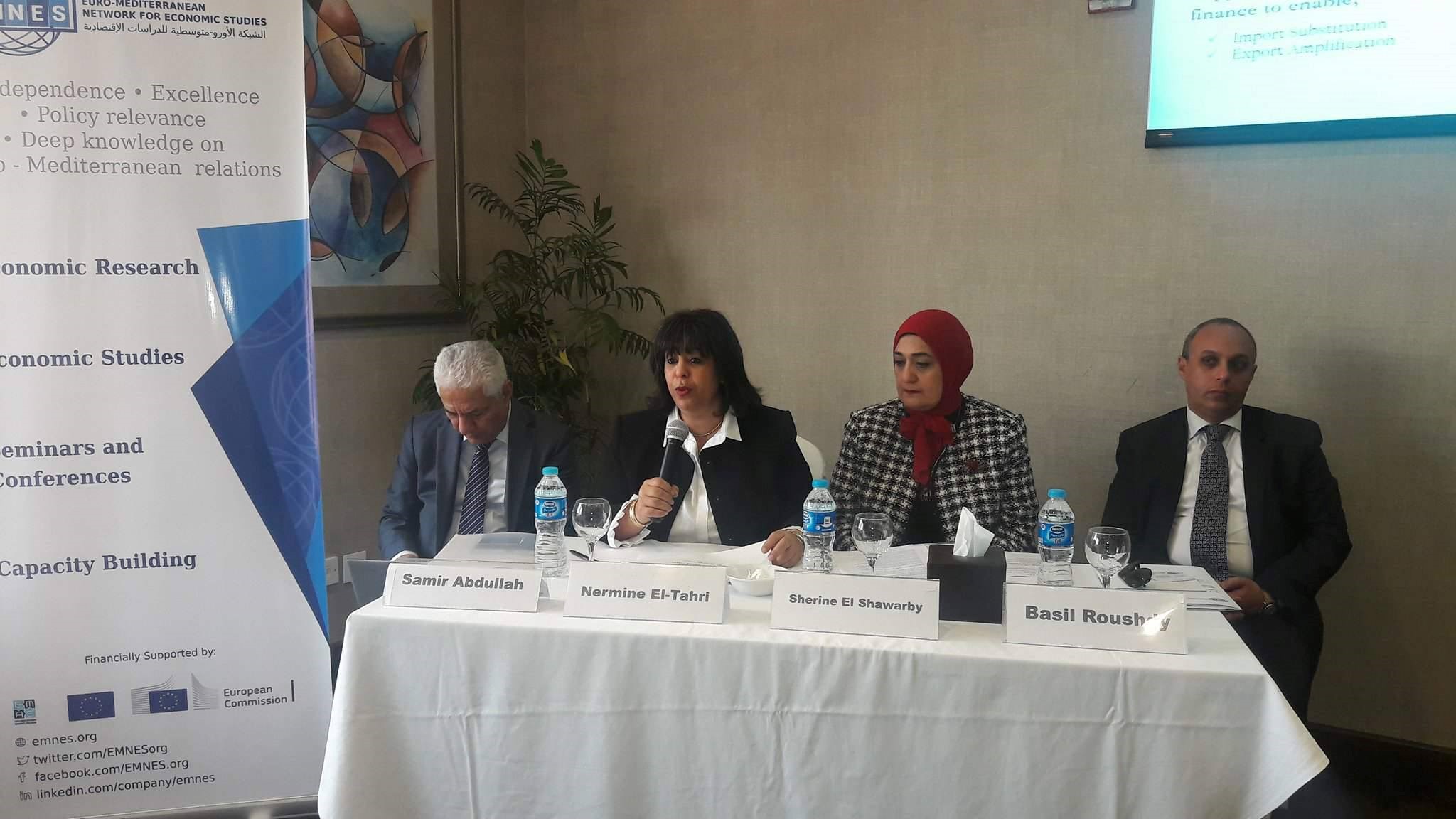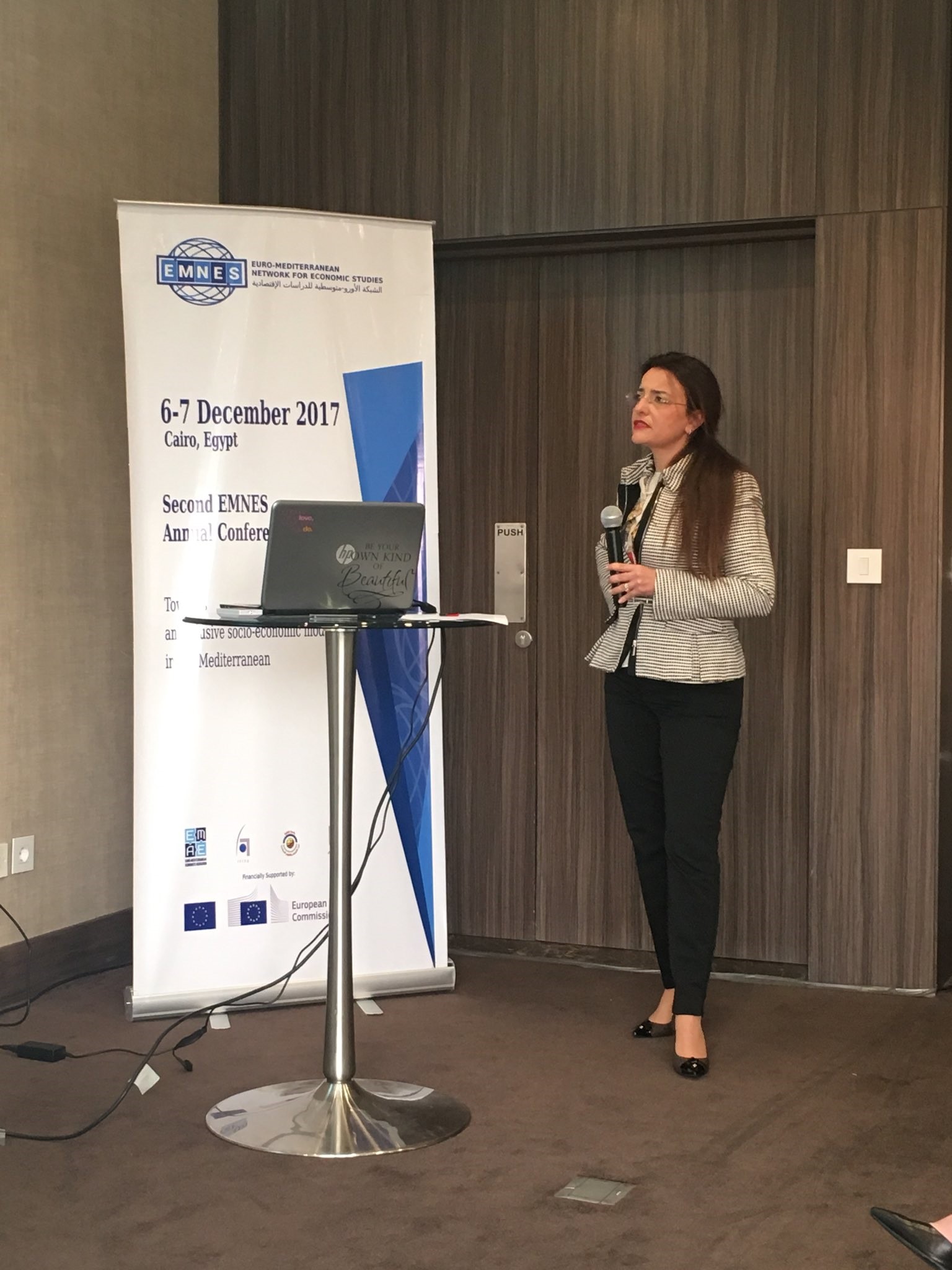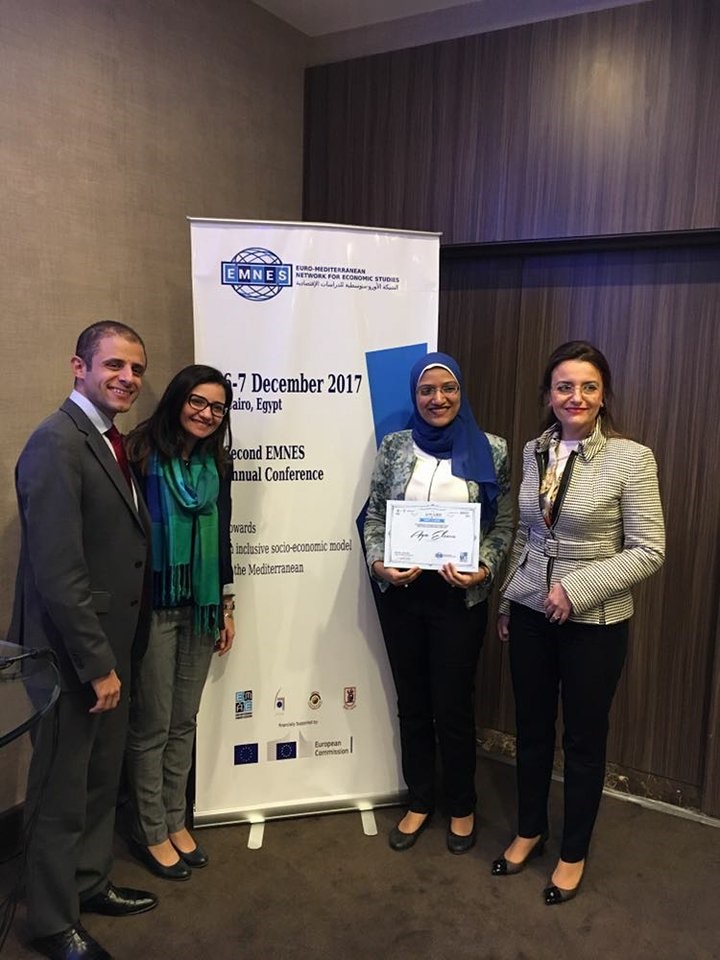2nd EMNES Annual Conference Report – Towards an inclusive socio-economic model in the Mediterranean
Steigenberger Hotel, Cairo, Egypt
- Introduction
- Welcome Speeches
- Introduction
- Policy Panel 1
- Academic session 1
- Academic session 2
- Academic session 3
- Policy panel 2
- Academic session 4
- Academic session 5
- Academic session 6
Introduction
In the aftermath of the 2011 Arab Uprisings in the Southern and Eastern Mediterranean, the region has reached a turning point in its history, presenting as many opportunities as challenges. The Arab world embarked on transitions of varying magnitudes, the outcome of which will be determined by the interaction between a number of factors, calling on both governments and external actors to design and implement new and specific strategies to cope with the new realities unfolding in the region. External actors – notably the European Union, which has a role to play as the key economic partner of the region – are expected to rethink their policies towards the region, as past political choices proved to be suboptimal in steering the region into a sustainable future. Most research on Southern and Eastern Mediterranean countries before the 2011 Arab uprisings failed to reveal the growing socio-economic tensions, underpinned by inefficient labour markets, low productivity, inadequate institutional capacity, market fragmentation and lack of integration, below-potential foreign direct investments, and weak contribution of micro, small and medium enterprises. This situation led to persistently high levels of unemployment, especially among the young, including most notably the educated ones, combined with increasing inequality.
The novel vision proposed by the Euro-Mediterranean Network of Economic Studies (EMNES) stems from the quest for economic policy solutions aimed towards more inclusive, sustainable and employment, driven by socio-economic development in the region. At the second EMNES Annual Conference, the outputs of the second year of research under the following six areas of investigation were presented.
- Institutions and labour markets;
- Private sector and micro, small and medium-sized enterprises;
- Finance, employment and the real economy;
- Human capital and skill mismatch;
- Macroeconomic policies, firms’ productivity and job creation;
- Regional integration and job creation.

Welcome Speeches
Hala El Said, Minister of Planning, Monitoring and Administrative Reform, Government of Egypt
H.E El Said started her speech by stressing the importance of EMNES, an academic network aimed at increasing the capacity of universities and other research institutions in the Mediterranean region to carry out policy relevant research, while providing the knowledge needed for future, fruitful policy dialogues for the region. The topics covered by the EMNES network, such as job creation, financial inclusion, firm productivity, micro and macro policies are crucial for Egypt and in line with the latest efforts of the Government of Egypt.
In 2016, Egypt was the first country in the region to adopt a Sustainable Development Strategy aligned with the United Nations’ Sustainable Development Goals. The latter focuses on ensuring equal opportunities for all and, most particularly, reducing gender gaps, while addressing the intertwining between economic, social and environmental issues. The first report will be presented in 2018.
The Government of Egypt has implemented a number of reforms to support economic growth and employment creation. The industrial licensing law was finalised to streamline bureaucratic procedures and boost investment, resulting in a substantial decrease in the time needed to obtain a licence, from 150 working days to a maximum of 30 days. The civil servants law was ratified, containing a number of measures to prevent conflicts of interest and to enhance evaluations, as well as hiring decisions. A new planning law was drafted to address developmental gaps between governorates and to enhance inclusion. In order to ensure the sustainability of these measures, a reform of public sector management, focused on the transparency and the efficiency of public administration, is also on the table.
The Government of Egypt also embarked on a concerted effort to cure some of the structural imbalances currently penalising the country’s economy, ranging from the liberalisation of foreign exchange and the injection of public money into infrastructural developments to pave the way for private investments in the implementation of a social package of EGP 85 billion (approximately €4 billion). The latter aims at alleviating the burden caused by economic liberalisation on the most vulnerable segments of the population, through financing of programmes such as karama and takafol.
Last but not least, several initiatives in support of micro, small and medium enterprises were launched, such as the ‘Entrepreneurs 2030’ project. Several collaborations with domestic and foreign universities are under discussion to enhance entrepreneurship education and to establish start-up incubators and accelerators. For example, an agreement was signed with the Faculty of Economics and Political Science of the University of Cambridge, to kick-off the country’s first professional master’s degree, focused on entrepreneurship.
Angel Gutierrez Hidalgo de Quintana, Head of Economic Cooperation at the European Union Delegation to the Arab Republic of Egypt
Mr. Gutierrez Hidalgo de Quintana recalled that the main challenge facing the region from an economic standpoint is making growth more inclusive. Egypt, among other countries, registered growth rates of up to 5%, sign of a recovery from the crisis, but this growth has not been inclusive, especially for youngsters and women. This means that new approaches are necessary to achieve better results and this is where the value added by a network such as EMNES lies – gathering young researchers from the region to think about novel solutions.
Micro, small and medium enterprises have a crucial role to play in inclusive growth. They provide the overwhelming majority of jobs in the region, on average more than 90%, but widespread informality limits their potential for job creation and has a negative effect on the quality of jobs created. The European Union supports initiatives in support of micro, small and medium enterprises and, more broadly, is in favour of private sector development. In Egypt, this takes the form of financial support for the new agency dedicated to the promotion of micro, small and medium enterprises, which is an important step in the right direction.
In 2018, the European Union’s External Investment Plan will become operational. The plan is a new facility for employment creation and, more broadly, for inclusive growth in the region, which will contribute to the development of the private sector, by working together with financial institutions in leveraging funding and providing a guarantee mechanism for micro, small and medium enterprises. Furthermore, collaborations between public and private actors will be encouraged via support to intermediary organisations. Overall, the expectation is to leverage €44 billion for the region.
Finally, trade promotion and regional integration lie at the very heart of the partnership between the European Union and countries in the region – two objectives that go hand-in-hand. In this regard, the potential of South-South integration and trade is largely untapped and is a priority for the European Union, reflected in the investment plan.
Introduction
Rym Ayadi, Professor at HEC Montreal and CASS Business School and EMNES Scientific Director
Prof. Ayadi thanked the special guests for their welcome speeches and welcomed all the participants to the second annual conference of EMNES, mentioning the symbolic value of organising it at the heart of Tahrir Square, one of the hotspots of the Arab Uprisings that shook the Mediterranean region in 2011. The uprisings resulted in increased tensions, mounting stress and widespread uncertainty which proved detrimental to economic outcomes, but also brought hope to the region’s youth that they could aspire to political systems granting them dignity, freedom and rule of law. From an economic standpoint, the aspiration for more inclusive economies in which the benefits of growth are more widely and fairly shared, underpinned the uprisings and translated into an urge for transition, towards an inclusive and sustainable socio-economic model for the region.
EMNES, a network of universities and think thanks bringing together senior and junior, male and female researchers in economics from both shores of the Mediterranean, explicitly aims at delineating an inclusive and sustainable socio-economic model for the region. In this second annual conference, the output of the research carried out throughout the year will be presented, based on a discussion of ten papers by EMNES researchers and seven by external researchers, whose contributions were selected by an EMNES-EMEA scientific committee. The papers will be presented via six academic panels, complemented by two policy panels focused on inclusive growth and private sector development. This interaction between research and policy, reflected in the organisation of the conference, lies at the heart of EMNES, which is committed to producing policy relevant research.
Prof. Ayadi continued her introduction with an overview of economic trends in the region, in the aftermath of the Arab Uprisings, and a brief discussion of what to do in the face of the most pressing economic challenges for Southern and Eastern Mediterranean countries.
The most significant economic trend in the years following the Arab Uprisings is the persistence of chronic unemployment affecting primarily the region’s youth and, more worryingly, the most educated youngsters. Among the main causes of youth unemployment, the dysfunctional relationship between education systems and labour markets, underdeveloped private sectors and resulting insufficient job creation, and the adverse effects of unequal terms of trade, were all mentioned. The employment crisis is also the main determinant of increasing migratory pressures across the Mediterranean together with their economic and political consequences. In the face of these challenges, institutional reforms aimed at tackling informality, education reforms aimed at enhancing the employability of youngsters, initiatives in support of micro, small and medium firms, as well as social businesses and rethinking the role of industrial policies and the financial system, were all highlighted as potential avenues for action.
Prof. Ayadi concluded with a mention of the very active role of the European Union in the region and a brief discussion of the main changes in its policies towards the region, which have been substantially reviewed in recent years. She then thanked everybody for attending the conference and wished them fruitful panel discussions.
Policy panel 1 – Inclusive growth and economic reforms in the mediterranean region
Nihal El Megharbel, UN Habitat Program
Dr. El Megharbel elaborated on the nexus between urbanisation and inclusive growth, starting with the presentation of a series of figures attesting to the significance and the magnitude of the urbanisation trend in Egypt and the world.
The relationship between urbanisation and inclusive growth is ambiguous. On the one hand, higher levels of urbanisation are associated with higher levels of GDP per capita. On the other hand, the growth of informal settlements, associated with the uncontrolled sprawl of urban areas, is a core driver of poverty and exclusion. For example, informal settlements account for more than half of newly created dwellings over the past twenty years in the Greater Cairo Area. The latter contributes to almost half of Egypt’s GDP but, at the same time, has higher poverty, illiteracy and inequality rates than the rest of the country, suggesting that harnessing urbanisation is central to achieving the twin goals of economic growth and social inclusion – dimensions at the heart of sustainable development.
UN Habitat proposed a national urban agenda for Egypt, aligned with the UN Sustainable Development Goals, which are more or less directly related to urbanisation. The proposed agenda includes guidelines for the management of urban growth and the balance between urban and rural development, along with provisions for territorial governance. Dr. El Merghabel concluded by stressing the importance of empowering local authorities to finance their own development plans, through institutional reform geared towards more decentralisation.
Hala Abou Ali, Egyptian Parliament
Dr. Abou Ali started her speech by arguing that every organisation has its own definition of inclusive growth, but that every definition has the concepts of equity and equality at its very heart, meaning that reducing inequalities must be an integral part of every strategy aimed at enhancing inclusiveness.
Inequality is a multidimensional phenomenon with causes including, but not limited to, disparities between genders and territories, rising shares of non-wage income from capital, non-redistributive tax and welfare systems, and the perverse effects of informality. This means that mainstreaming inclusiveness in policy-making requires a holistic approach and the integration of economic, social and environmental policies into a national framework for inclusive growth.
There are existing frameworks that can be taken as an example, as those developed by the World Economic Forum or the Organisation for Economic Cooperation and Development. In both frameworks, governance and institutional reforms are the common denominator of economic, social and environmental reform, which will not go through without integrated and interactive efforts from all relevant stakeholders, to ensure that the institutions involved in the formulation and implementation of the reforms are transparent and accountable. The quote “economic reforms without political reforms are trees without roots, political reforms without economic reforms are trees without fruits” is particularly evocative in this concern.
In fact, everyone has an important role to play. The government has the responsibility to propose the reforms and the related changes in the laws, while making sure that these are enforceable and enforced. The parliament is responsible for setting priorities and translating them into financial commitments, while improving and approving the changes proposed by the government. The private sector is responsible for mobilising capital investments, while engaging in strategic partnerships with the public sector. The wider population has the responsibility of participating in the efforts, instead of being a passive recipient.
Khaled Zakaria, Advisor to the Minister of Planning, Monitoring and Administrative Reform, Government of Egypt
Dr. Zakaria presented his work on the pillars of inclusive growth and detailed the initiatives of the MoPMAR in relation to the various pillars.
The first pillar consists of ensuring that everybody can participate in the decision-making process. The MoPMAR created a committee for national planning, composed of scholars and experts, rather than government officials. Furthermore, it is exploring avenues to enable the greater public to participate in the prioritisation of the envisioned plans.
The second pillar consists of empowering people to participate in economic growth, something that requires ensuring high levels of employment, investing in skills, modernising labour markets and reducing inequalities. The initiatives under consideration by the MoPMAR include considering the education and health sectors as a priority for government action, investing in labour intensive projects and expanding budgets for training and entrepreneurial programmes.
The third pillar consists of ensuring that the benefits of economic growth are shared equitably. The initiatives under consideration include investing in lagging areas, targeting developmental gaps rather than entities responsible for fighting them in the allocation of government funds, fighting corruption and engaging in a reform of the current system of subsidies.
The fourth pillar consists in broad-based actions across sections. The MoPMAR participated in the definition of the country’s Sustainable Development Strategy, acknowledging the interrelation between the economic, social and environmental dimension of development.
Academic session 1 – institutions, growth and employment
Paper 1: Formal and informal institutions as determinants of informal employment
Presenter: Racha Ramadan (FEPS)
Authors: Racha Ramadan, Asmaa Ezzat and Hanan Nazier (FEPS)
The paper sheds light on the role of institutions and values in the likelihood of being employed informally in Jordan, Egypt and Tunisia. The authors examine the determinants of informal employment using data from Labour Market Panel Surveys, World Value Survey and World Governance Indicators. The results show that education and values play an important role in the decision of being informally employed, but that institutions also matter.
Paper 2*: The effects of institutions and natural resources in heterogeneous growth regimes with endogeneity
Presenter: Yacine Belarbi (CREAD)
Authors: Yacine Belarbi, Lylia Sami and Saïd Souam (CREAD)
The paper focuses on the interaction between resource endowment and institutional quality, to explain outcomes in terms of corruption and economic growth of countries rich in oil resources. The authors use a specific econometric approach to identify the threshold, starting from which the “resource curse” can be reversed, allowing for endogeneity. The analysis brings evidence that:
- large oil exports lead to more corruption, regardless of the quality of institutions and the level of income, but in countries with a higher income per capita, corruption increases less in relation to large oil exports;
- large oil exports increase economic growth, regardless of the level of corruption, while more democracy only has a positive impact on economic growth in less corrupted economies.
Academic session 2: firm productivity and job creation
Paper 3: On modelling the determinants of TFP in the MENA region: macro-micro firm-level evidence
Presenter: Nesreen Seleem (FEPS)
Authors: Nesreen Seleem and Chahir Zaki (FEPS)
This paper examines the determinants of total factor productivity in MENA countries, using data from the enterprise surveys. The authors provide TFP estimates by country and sector and examine how TFP changes by export status, age, firm size, formal status and ownership, in considering micro (firm level) and macro (nation level) determinants of TFP. The findings attest that among micro determinants, owning a foreign certification is positively associated to TFP, but that in general macro determinants, such as trade policy and institutions, tend to be more important than micro ones. In particular, higher tariffs have a significantly negative impact on TFP in micro, small and medium firms and a longer time to enforce contracts on the TFP of all firms.
Paper 4: Employment intensity and sectoral output growth: a comparative analysis for MENA economies
Presenter: Chahir Zaki (FEPS)
Authors: Chahir Zaki and Nesreem Seleem (FEPS), Mohamed Goaied (IHEC), Nooh Alshyab and Suhail Maghableh (YU), Marouane Raissi and Nabil Boubrahimi (Ibn Tofail University)
This paper examines whether economic growth was accompanied by net job creation in Egypt, Jordan, Morocco and Tunisia, looking into the relationship between sectoral output growth and employment intensity. The authors estimate employment-value added elasticities at the sectoral level, using a random coefficient estimation technique. The findings show that, while manufacturing is the most important sector that creates jobs in Egypt and Morocco, services are more important in Jordan and Tunisia. For all countries, the contribution to job creation of the capital-intensive mining sector is insignificant.
Paper 5*: Fixed-mobile substitution in MENA countries: what is the future of the fixed-line market?
Author: Riham Ahmed Ezzat (FEPS)
This paper analyses the relationship between fixed and mobile telephones in the MENA region, the second fastest growing region in the world for mobile subscriptions in 2012, using dynamic panel data models for the period 1990-2009. The empirical results point towards a one-way substitution between fixed-lines and mobiles phones which are used to estimate own- and cross-price elasticities for fixed and mobile telephone services. The paper concludes with a discussion of policy implications regarding lifting regulatory constraints, market redefinition and the extension of universal services for mobile services.
Academic session 3 – human capital, skills mismatches and migration
Paper 6: Skills mismatch and return on education
Author: Jamel Trabelsi (ITCEQ)
This paper evaluates the impact of educational and skills mismatch on returns to education, using an extended version of the Duncan and Hoffman equation and the results of the school-to-work transition survey, conducted by the International Labour Organisation in Tunisia. The empirical findings reveal that the estimated return to education increases with the educational level, in line with the expectations of university students, but that such returns decrease when workers are over-educated, suggesting that over-education introduces a wage penalty.
Paper 7*: Job search intensity and the role of social networks in finding a job in Arab countries: a case study of Algeria and Jordan.
Presenter: Moundir Lassassi (CREAD)
Authors: Moundir Lassassi (CREAD) and Ibrahim Alhawarin (Al Hussein Bin Talal University)
This paper investigates the role of social networks as determinants of job search intensity and on the probability of finding a job in Jordan and Algeria using econometric techniques. The findings show that social networks are crucial for labour market intermediation in both countries, where less than 5% and 9% respectively of the young employed mentioned that public intermediation agencies helped them to find a job. The results also suggest that job search is more intensive in Jordan compared to Algeria and that the role of social networks is less prominent when it comes to skilled jobs, while it increases the chances of finding informal jobs.
Paper 8*: Return migration and social mobility in MENA: evidence from labour market panel surveys
Presenter: Vladimir Hlasny (Ewha Womans University)
Authors: Vladimir Hlasny (Ewha Womans University) and Shireen Al Azzawy (Leavey School of Business)
This study aims to examine the implications of cross-border return migration for intertemporal and intergenerational transmission of socio-economic status in Egypt (1988-2012), Jordan (2010-2016) and Tunisia (2014). The preliminary findings suggest that migration patterns differ between Egypt, Jordan and Tunisia, both in terms of prevalence and of impact on labour market outcomes. Cross-region migration is found to alleviate youth unemployment, but to put pressure on labour markets in urban areas. Outward-migration affects the division of labour in households and, more broadly, labour market performance. Furthermore, inflows of remittances to rural regions, particularly in Jordan and Egypt, are found to alleviate economic inequality. Finally, returning migrants obtain better occupations or self-employment, affecting not only their short-term welfare, but also their lifelong occupational and social mobility.
Paper 9*: Why has increasing educational attainment had so little effect on labour force participation for women in MENA Countries?
Presenter: Moundir Lassassi (CREAD)
Authors: Moundir Lassassi (CREAD), Ragui Assaad (University of Minnesota), Rana Hendy (Economic Research Forum), Chaimaa Yassine (Paris School of Economics)
This paper looks into the constraints to labour force participation of educated women in Algeria, Egypt, Jordan and Tunisia. The authors use labour force survey data to analyse trends in public sector employment, private sector wage or non-wage employment, unemployment or non-participation in the labour force of married and unmarried women, allowing for age groups and educational levels. The findings suggest that the contraction in public sector employment opportunities was not compensated for by an increase of employment opportunities in the formal private sector, resulting in declining labour force participation among highly educated females.
Policy panel 2 – Private sector dynamics and social business
Nermine El Tahri, Central Bank of Egypt
Mrs. El Tahri stressed the importance of supporting micro, small and medium enterprises to sustain economic growth in Egypt and that the Central Bank of Egypt is committed to being part of the ecosystem that supports such enterprises. For that purpose, a blueprint, focused on employment creation and financial inclusion, was developed and initiatives on many fronts were launched.
The central bank does not ask micro, small and medium firms to provide financial statements in the first two years of their existence but, instead, assists them in the production of such statements. Other services aim at increasing the capacity of firms to meet quality standards in financial accounting and obtaining the related certifications. Furthermore, a rating module and an automated tool for the follow-up of credit history, were developed to guide the actions of national and international financial institutions in support of micro, small and medium enterprises.
The banking sector started slowly but surely, providing funding to micro, small and medium enterprises and, to support this trend, the Central Bank of Egypt started providing guarantees to loans. This is largely done through a credit guarantee scheme in which the central bank takes a majority stake. The scheme has existed for decades, but was seen as an insurance company and not living up to its potential. In addition to that, innovative projects are endorsed in an effort to facilitate access to financing in order to compensate for banks that often lack the capacity to identify promising initiatives. This kind of endorsement is crucial for the development of tech industries, which are mushrooming in the country, and the upgrading of micro, small and medium firms in regional and global value chains.
The Central Bank of Egypt has been also exploring new avenues for collaboration with public and private entities, such as the NilePreneur Initiative, private sector initiatives supported by the central bank in cooperation with ten private banks, as a catalyst to bank financing, but also to provide non-financial services.
Basil Roushdy, Nile Capital Group
Mr. Roushdy presented concrete initiatives in support of micro, small and medium enterprises of the Nile Capital Group, a private equity firm specialising in providing capital and services to talented managers and promising firms, bringing to the conference the perspective of the private sector.
The ecosystem of micro, small and medium enterprises in Egypt, as much as in other countries, is heterogeneous and providing support requires a combination of specific and diversified knowledge. This is why, for example, when it comes to providing access to finance, there is an increasing use of co-financing schemes involving private equity firms, such as Nile Capital Group and leasing companies, for example. These collaborations are meant to put in place a win-win, not a zero-sum partnership with business owners, enabling them to expand both vertically and horizontally without fear of losing ownership of their business to the bank. This is also the idea behind the provision of intellectual services associated with financing, such as helping the micro, small and medium firms in laying down business plans and keeping the highest standards of financial accounting.
The ecosystem is heterogeneous but two broad categories of firms can be singled out when it comes to providing financial and intellectual support, namely traditional and innovative firms. There are differences in what makes them potentially successful and, therefore, in what is needed to make them attractive in the medium to long term, and this is taken into due consideration at the Nile Capital Group. These firms are also subject to different laws and regulations and often business owners require support in navigating through the latter, something that is also provided alongside financial support.
Samir Abdullah, Palestine Economists Association
Dr. Abdullah started his presentation arguing that a large part of the obstacles facing Palestinian micro, small and medium enterprises in their development is related to the political situation with Israel.
Palestinian firms suffered from unfair competition from heavily subsidised Israeli firms, until the latter eventually shifted to higher value-added industries, leaving some margin for Palestinian firms in traditional sectors to thrive. This changed once again with Israel’s accession to the World Trade Organisation and the resulting unfair competition from foreign firms benefitting from free trade, while the checkpoints of the Israeli authorities de facto cut off Palestinian firms from international markets. In this respect, estimates suggest that logistics’ costs increased 2.3 times more for exports and 3.8 times for imports for Palestinian firms, compared to their Israeli counterparts.
The cost of the so-called Israeli occupation has been estimated at $7 to 9 billion per year, while donor support amounts to $600 million per year. In such circumstances, it is virtually impossible for micro, small and medium firms to thrive. This situation is unsustainable, not only for Palestine but also for Israel.
Academic session 4: micro, small and medium firms and entrepreneurship
Paper 10: Success factors for SME growth in the Mediterranean
Presenter: Rim Mouelhi (IHEC)
Authors: Rim Mouelhi and Monia Ghazali (IHEC)
This paper looks into the main constraints to and enabling factors for the growth of micro, small and medium enterprises in Egypt, Jordan, Morocco and Tunisia. The authors use a multinomial logit model to investigate how a number of characteristics of these firms, their managers and the business environment interacted with their development, calculated in terms of employment growth, between 2009 and 2012. The findings point to the important role of innovation as an enabling factor and political instability, as well as regulatory constraints, as constraints to the growth of micro, small and medium enterprises.
Paper 11: Entrepreneurship and innovation: a survey for Morocco and Jordan
Author: Ilyas Azzioui (IAV)
This study looks into the emergence of innovative start-ups in Morocco, following an exploratory approach based on the conduct of in-depth interviews with entrepreneurs managing nascent and young start-ups. The preliminary results suggest that innovative start-ups are often founded by highly educated youngsters, driven by a perceived business idea rather than actual market opportunity. The preliminary results also suggest that while young entrepreneurs are confident in their technical skills and have access to a relatively wide range of sources for information and advice, they often lack managerial skills and have a limited number of sources to access financing.
Paper 12*: Industrial structure and performance in Egypt
Presenter: Reham Rizk (BUC)
Authors: Reham Rizk (BUC), John Dunne (Cape Town University) and Ricardo Nogales (Universidad Privada Boliviana)
This paper consists of an empirical analysis of the relation between core characteristics of firms, such as size and age, and their economic performance with the objective of shedding light on the evolution of the industrial structure in Egypt between 2008 and 2016. The rationale behind the paper is that having a wide range of firm size and ages is important for innovation and sustained growth.
Academic session 5 – financial development, growth, employment and inequality
Paper 13: Financial development and employment
Presenter: Rym Ayadi (EMUNI)
Authors: Rym Ayadi (EMUNI), Mohamed Goaied (IHEC) and Sami Ben Naceur (IMF).
This paper complements the existing literature by assessing the effect of financial development on employment and unemployment, using an unbalanced panel of 171 countries for the period 1995-2015. The following findings are established. First, financial institution efficiency and access do significantly and positively affect employment in the linear specification. Second, financial institution inclusion and employment display a non-linear U-Shape relationship, where financial institution boosts employment up to point, after which the impact turns negative. Third, the positive effect of financial development on employment strengthens with the country’s institutional quality. Fourth, there is clear evidence that financial institution depth and financial market development contribute to increased female employment. Fifth, financial development only impacts positively and significantly on employment in middle and high income countries.
Paper 14: Credit growth and inequality
Presenter: Sandra Challita (EMEA)
Authors: Sandra Challita (EMEA), Rym Ayadi (EMUNI) and Sami Ben Naceur (IMF)
The literature on financial development and income inequality suggests that the former can result in the latter through credit booms. This paper empirically investigates the circular relationship between financial development, credit booms and inequalities at the global and the regional level.
Academic session 6 – economic integration and employment creation
Paper 15: Do exports and innovation matter in the demand of skilled labour? Evidence from MENA Countries
Presenter: Chahir Zaki (FEPS)
Author: Nora Abou-Shady and Chahir Zaki (FEPS)
The objective of the paper is to test the impact of exports and innovation on the demand of skilled labour in the MENA region using firm-level data. The contribution of the paper is twofold. First, the authors extend the analysis of Bustos (2011) by examining the nexus between exports and skill bias through several indicators of innovation and technology adoption. Second, they test this relation for nine MENA countries using firm-level data from the World Bank Enterprise Survey (2013). The findings suggest a positive and significant impact of exports on innovation and technology adoption. The authors also find a significant and positive effect of technology on the demand for skilled production and non-production labour, especially for large firms. Meanwhile, medium-sized enterprises seem to be disadvantaged when it comes to skilled labour demand, which appears to be negatively affected by innovation.
Paper 16*: Coexistence of small and large firms: how does product mix respond
Author: Aya Elewa (Paris School of Economics)
This paper investigates how multi-product firms respond to tougher competition and greater market size across destinations, assuming a double heterogeneity, within industry and within firm in the same industry. Building a theoretical model where monopolistically competitive and oligopolistic firms coexist in the same market, the paper studies how an increase in market size affects the behaviour of both types of firm. The model shows that the final impact of bigger market size on the product-mix of multi-product firms depends on the level of fixed entry costs. For low level of entry costs, large firms increase their product-mix when they export to larger markets, as they benefit from scope economies. Yet, when fixed costs are prohibitive, a larger market induces firms to skew their export sales towards their core product. Very strong confirmation of this non-monotonic effect of market size was found for Egyptian exporters across export market destinations.
* Invited papers under the EMNES-EMEA call for papers organised for the conference, which targeted young scholars from the region focusing on topics relevant to the EMNES network.




